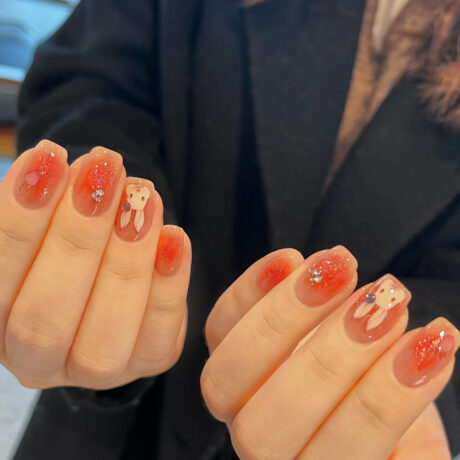What Is a Good Homemade Cuticle Oil?
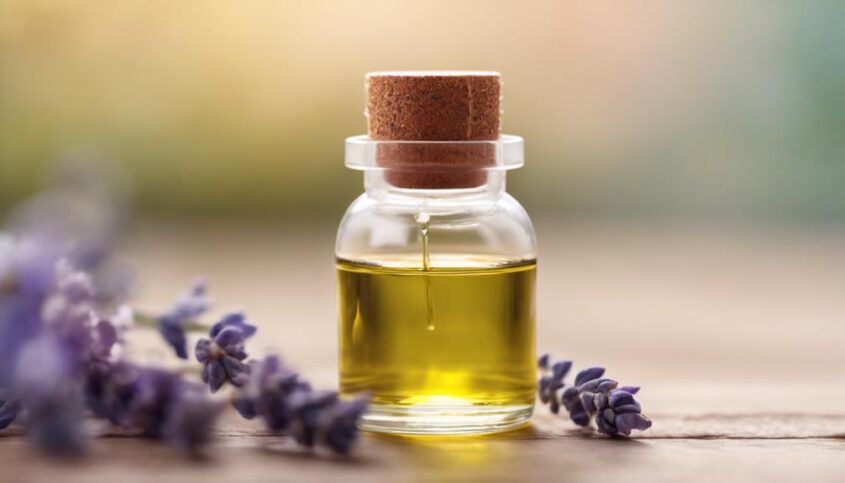
Creating a good homemade cuticle oil involves choosing ingredients that nourish, strengthen, and protect nails and cuticles. Key components like essential oils such as lavender, tea tree, and lemon offer unique benefits. Carrier oils like jojoba and sweet almond are popular choices for their moisturizing properties. Including vitamin-enriched additions such as E and C can further enhance nail health. Careful selection of natural ingredients is essential, avoiding harmful components. Proper storage in dark glass bottles is crucial for maintaining freshness. Experimenting with DIY recipes tailored to individual preferences can lead to healthier nails and cuticles. Enhance your nail care routine with these effective tips.
Key Takeaways
- Use natural ingredients like coconut oil and vitamin E for moisturizing and strengthening properties.
- Incorporate antibacterial essential oils like lavender or tea tree oil for added benefits.
- Opt for carrier oils such as jojoba and sweet almond oil to hydrate and nourish cuticles.
- Experiment with different oils like rosemary for circulation and nail growth.
- Customize DIY recipes to suit preferences and promote healthy nails and moisturized cuticles.
Benefits of Homemade Cuticle Oil
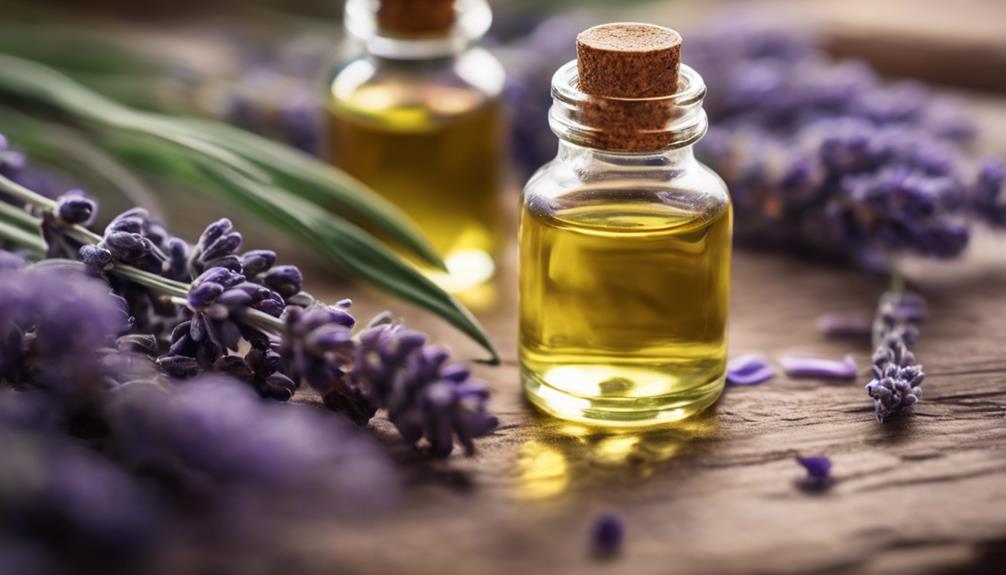
Regularly applying homemade cuticle oil can significantly improve the health and appearance of your nails and cuticles. Cuticle oil helps to moisturize and nourish the skin around your nails, preventing dryness, cracking, and hangnails. By keeping your cuticles healthy, you also promote stronger and faster nail growth, resulting in overall improved nail health.
In addition to the physical benefits, using homemade cuticle oil can also provide a relaxing and therapeutic experience. The act of massaging the oil into your cuticles can help reduce stress and promote a sense of well-being. Taking the time to care for your nails and cuticles can be a form of self-care, allowing you to pamper yourself and show yourself some love.
Essential Oils for Cuticle Care
When it comes to cuticle care, choosing the best essential oil is crucial for promoting healthy nails and skin. Understanding the various application methods and tips for using essential oils can help maximize their benefits for your cuticles. Incorporating essential oils into your nail care routine can nourish, strengthen, and protect your cuticles, keeping them looking their best.
Best Essential Oil?
For optimal cuticle care, selecting the best essential oil is essential to nourishing and strengthening your nails and surrounding skin. Essential oils are natural plant extracts known for their various beneficial properties. When choosing an essential oil for your homemade cuticle oil, consider options like Lavender, Tea Tree, Lemon, or Frankincense. Each oil offers unique benefits such as anti-inflammatory, antimicrobial, and hydrating properties. Here is a comparison of these popular essential oils:
| Essential Oil | Benefits | Skin Type |
|---|---|---|
| Lavender | Soothes and promotes healing | All skin types |
| Tea Tree | Antimicrobial and antifungal | Oily, acne-prone |
| Lemon | Brightens and clarifies skin | Dull, uneven |
| Frankincense | Hydrating and anti-aging | Dry, mature |
Application Methods and Tips
Exploring diverse application methods and expert tips for utilizing essential oils in cuticle care enhances the effectiveness of your homemade cuticle oil regimen. When applying essential oils to your cuticles, consider diluting them with a carrier oil like sweet almond or jojoba oil to prevent skin irritation. Gently massage the oil into your cuticles and nails to improve circulation and promote healthy nail growth. For a relaxing experience, warm the oil slightly before application. To lock in moisture, consider wearing cotton gloves after applying the oil overnight. Regular application, preferably daily or a few times a week, will help maintain soft and healthy cuticles. Remember, consistency is key in achieving optimal results for your nail and cuticle care routine.
Benefits for Cuticles
Utilizing essential oils in cuticle care can provide numerous benefits for promoting healthy and nourished cuticles. Essential oils like tea tree oil possess antifungal and antibacterial properties, helping to prevent infections and promote overall cuticle health. Lavender oil is known for its calming and soothing effects, which can reduce inflammation and redness around the cuticles. Lemon oil contains vitamin C, aiding in collagen production for stronger and healthier cuticles. Additionally, jojoba oil is a popular choice for moisturizing cuticles and preventing dryness. Regular use of essential oils in cuticle care can help maintain the skin's integrity, prevent hangnails, and promote a neat and tidy appearance for well-groomed hands.
Carrier Oils for DIY Recipes
When creating DIY cuticle oil, selecting the right carrier oils is essential for achieving optimal results. Carrier oils are crucial in diluting essential oils and delivering their benefits effectively to the skin. Some popular carrier oils for homemade cuticle oil recipes include jojoba oil, sweet almond oil, coconut oil, and grapeseed oil.
Jojoba oil is a versatile carrier oil that closely mimics the skin's natural oils, making it an excellent choice for nourishing and moisturizing the cuticles. Sweet almond oil is rich in vitamins and antioxidants, helping to soften the cuticles and promote healthy nail growth. Coconut oil is known for its hydrating properties, making it ideal for dry and damaged cuticles. Grapeseed oil is lightweight and easily absorbed, making it a great option for those with oily skin.
Each carrier oil brings its unique benefits to DIY cuticle oil recipes, allowing you to customize the blend based on your specific needs and preferences. Experimenting with different carrier oils can help you find the perfect combination that leaves your cuticles looking and feeling their best.
Vitamin-Enriched Additions
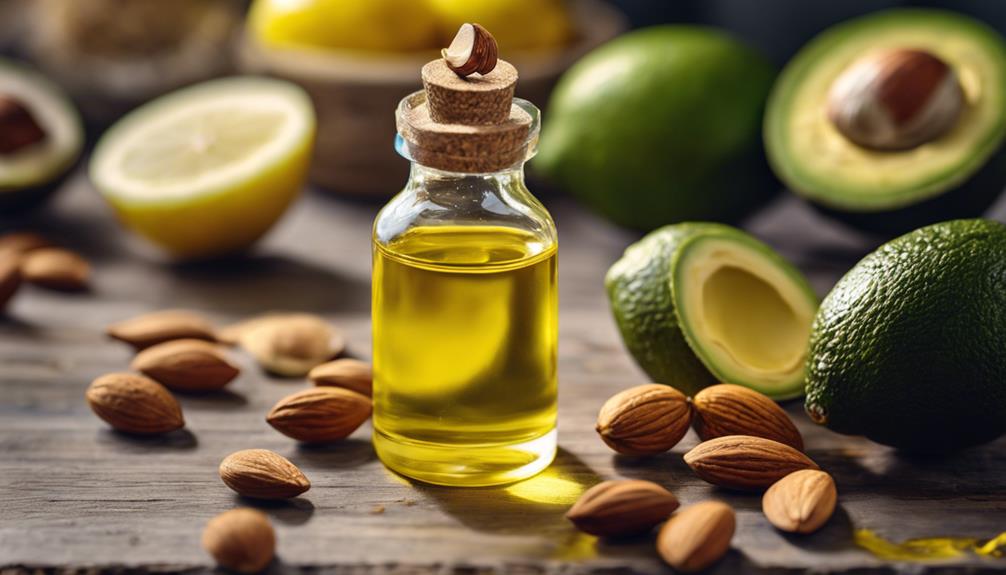
To enhance the nourishing properties of homemade cuticle oil, incorporating vitamin-enriched additions can amplify the benefits for your cuticles and nails. Vitamins play a crucial role in maintaining the health and strength of your nails and cuticles. Vitamin E, known for its antioxidant properties, can help repair and hydrate damaged cuticles, promoting healthy nail growth. Vitamin C is another essential vitamin that can aid in collagen production, improving the overall appearance and strength of your nails. Including vitamin-enriched oils like avocado oil, rich in vitamins A, D, and E, can further nourish and protect your cuticles from dryness and cracking. Additionally, oils infused with vitamin B7, commonly known as biotin, can help strengthen brittle nails and stimulate growth. By incorporating these vitamin-enriched additions into your homemade cuticle oil, you can provide your nails and cuticles with the essential nutrients they need to thrive and maintain their health and beauty.
Natural Ingredients to Avoid
When creating homemade cuticle oil, it is crucial to be mindful of harmful natural ingredients, synthetic fragrances, and dyes, as well as petroleum-based ingredients. These substances can potentially irritate the skin or cause adverse reactions, undermining the purpose of the cuticle oil. Opting for natural and non-toxic alternatives will ensure a safe and beneficial product for your nails and cuticles.
Harmful Natural Ingredients
Some natural ingredients, despite their origin, can be harmful and should be avoided in cuticle oil formulations. Ingredients such as citrus oils like lemon or lime can increase sensitivity to sunlight and lead to skin irritation. Essential oils such as cinnamon, clove, and oregano can also be harsh on the skin and cause irritation. Additionally, some individuals may have allergic reactions to ingredients like almond oil or soybean oil, so it's important to be cautious when using them in cuticle oil recipes. To ensure the safety and effectiveness of homemade cuticle oil, it is crucial to research and understand the potential risks associated with natural ingredients before incorporating them into your formulation.
Synthetic Fragrances and Dyes
Considering the potential risks associated with certain natural ingredients, it is important to be mindful of synthetic fragrances and dyes when formulating homemade cuticle oil. When creating your own cuticle oil, it is best to avoid synthetic fragrances and dyes due to their potential harmful effects on the skin. Here are some synthetic ingredients commonly found in beauty products that should be avoided:
- Parabens: Used as preservatives, parabens can cause skin irritation.
- Phthalates: Found in fragrances, phthalates can disrupt hormones and may be harmful to reproductive health.
- Synthetic Dyes: Artificial colors can cause allergic reactions and skin irritation.
- Fragrance Oils: These can contain numerous undisclosed chemicals that may be harmful to the skin and overall health.
Petroleum-Based Ingredients
Petroleum-based ingredients are commonly used in skincare products but should be avoided when formulating homemade cuticle oil due to their potential adverse effects on skin health. These ingredients, such as mineral oil and petrolatum, may clog pores, leading to skin irritation and breakouts. When creating a nourishing cuticle oil, opt for natural alternatives like plant-based oils and essential oils that offer similar moisturizing benefits without the drawbacks of petroleum-based ingredients.
| Natural Ingredients to Avoid |
|---|
| Mineral Oil |
| Petrolatum |
| Paraffinum Liquidum |
| Propylene Glycol |
| Butylene Glycol |
How to Store Homemade Cuticle Oil
To maintain the quality and effectiveness of homemade cuticle oil, proper storage is essential. Here are four key tips to ensure your DIY cuticle oil stays fresh and potent for longer:
- Dark Glass Bottles: Store your homemade cuticle oil in dark glass bottles to protect it from light exposure, which can degrade the oil and reduce its effectiveness over time.
- Cool, Dark Place: Keep the cuticle oil in a cool, dark place away from direct sunlight and heat sources. Excessive heat can cause the oil to go rancid more quickly.
- Tightly Sealed: Always make sure the cap or lid of the bottle is tightly sealed to prevent air from entering and oxidizing the oil. This will help maintain its nourishing properties.
- Labeling and Date: Label the bottle with the ingredients used and the date it was made. This will help you track the shelf life of the cuticle oil and ensure you use it before it expires.
DIY Cuticle Oil Recipes
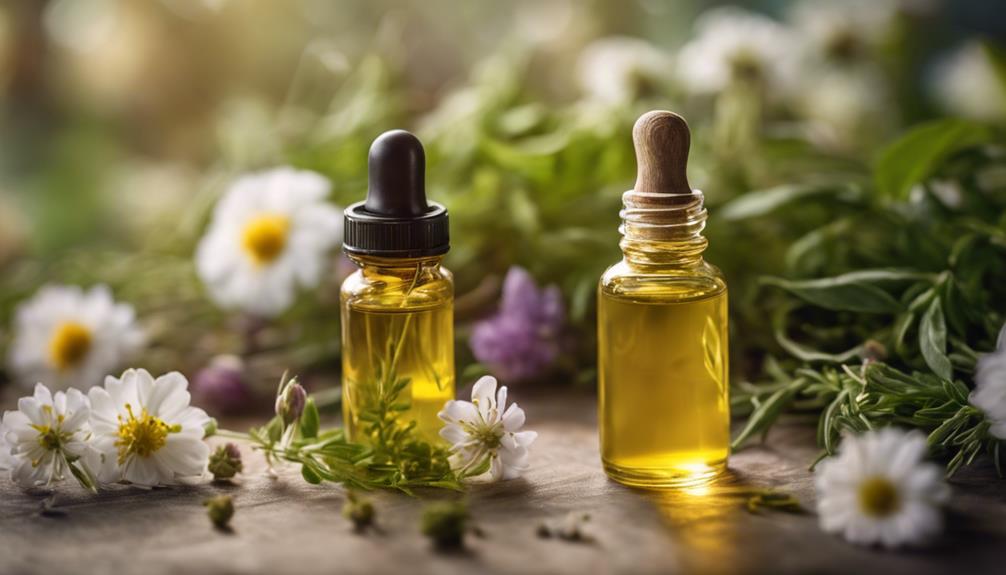
Crafting your own DIY cuticle oil at home is a simple and rewarding way to nourish and protect your nails and cuticles. By using natural ingredients, you can customize the oil to suit your needs and preferences. One popular recipe involves mixing equal parts of coconut oil and vitamin E oil, known for their moisturizing and strengthening properties. For added benefits, consider adding a few drops of essential oils such as lavender or tea tree oil for their antibacterial and soothing qualities.
Another effective DIY cuticle oil recipe includes jojoba oil, sweet almond oil, and a few drops of rosemary essential oil. Jojoba oil mimics the skin's natural oils, while sweet almond oil helps to soften and hydrate the cuticles. Rosemary essential oil not only adds a pleasant scent but also promotes circulation, aiding in nail growth.
Experiment with different combinations of carrier oils and essential oils to find the perfect DIY cuticle oil that will leave your nails healthy and your cuticles moisturized.
Frequently Asked Questions
Can Cuticle Oil Help With Nail Growth?
Cuticle oil helps nourish and hydrate the cuticles, promoting healthier nails. While it doesn't directly stimulate nail growth, maintaining well-moisturized cuticles can indirectly support stronger, longer nails by preventing breakage and promoting overall nail health.
Will Homemade Cuticle Oil Spoil Quickly?
Homemade cuticle oil can spoil quickly if not stored properly. Factors like exposure to sunlight, air, and heat can accelerate rancidity. To prolong its shelf life, store it in a cool, dark place and consider adding natural preservatives.
Is It Safe to Use Cuticle Oil Daily?
Using cuticle oil daily can be safe if it is formulated with gentle, nourishing ingredients. However, overuse may cause dependency. It's advisable to consult a professional for personalized advice on frequency and type of cuticle oil.
Can Cuticle Oil Be Used on Toenails?
Yes, cuticle oil can be used on toenails. It helps nourish and moisturize the toenail bed and surrounding skin, promoting healthy growth and preventing dryness. Apply a small amount and gently massage into the toenails for best results.
How Long Does Homemade Cuticle Oil Last?
The longevity of homemade cuticle oil can vary based on individual factors like storage conditions and ingredients used. Generally, a well-made oil can last for several months if stored in a cool, dark place to prevent oxidation.




